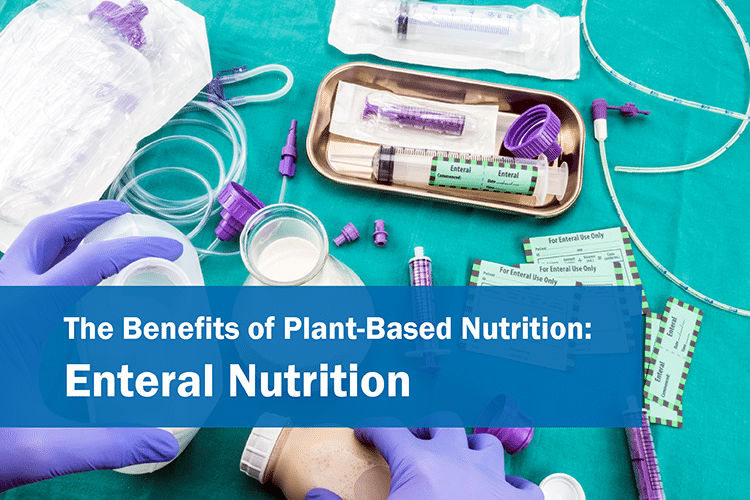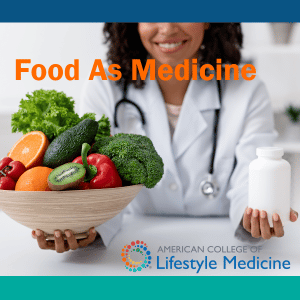The Benefits of Plant-Based Nutrition: Enteral Nutrition
Nutrition is essential in disease prevention during recovery and recuperation of acute or chronic illness. Plant-based enteral nutrition options offer a safe alternative to standard enteral formulas and may help to avoid bloating and diarrhea.

Abstract
Nutrition plays an essential role in disease prevention during recovery and recuperation of acute or chronic illness. During prolonged illness or hospitalization, one can nourish and maintain nutrition via enteral and parenteral routes. Several studies have demonstrated that using enteral delivery of nutrition whenever feasible helps to keep the integrity of the gut and gut microbiome intact.
Enteral feeding provides nutrition through the mouth or a feeding tube to the gastrointestinal tract (GI) to deliver nutrients and meet caloric requirements.1 Enteral nutrition via feeding tube can serve as either the primary or supplemental feeding source in patients unable to eat via mouth due to injury (trauma), illness (cancer/radiation), or neurological challenges (e.g., after a stroke) who may be at a disadvantage in taking in necessary amounts of micro and macronutrients needed to nourish, recover, or heal.
In the intensive care unit (ICU), tube feeding intolerance is common and may account for the failure to thrive.2 Standard enteral formulas are often poorly tolerated and could be lacking in vital phytonutrients depending on the feeds used. Most enteral formulas widely available and covered by insurances are highly processed, low in fiber, and high in added sugars or artificial sweeteners, which are associated with gastrointestinal (GI) intolerance and nutritional deficiencies. Dietary intake affects the body’s ability to heal and function and supports the gut microbiota, which is dependent on dietary fiber for energy. Plant-based enteral formulas have demonstrated improved clinical outcomes in both children and adults regarding adherence and gastrointestinal symptoms. This could be due to the added nutritional value from fruits and vegetables, with their higher fiber content and the avoidance of artificial ingredients, including high-glycemic sweeteners and oils.3 Nutrients found in plant-based foods such as omega-3 fatty acids and antioxidants have been shown to ameliorate inflammation and decrease the length of stay in some critically ill patients. These nutrients are found in plant-based enteral formulas. Plant-based products formulated with non-allergenic foods and of higher dietary quality should be readily available as the first line of enteral care.
Key Points for Practitioners
- Plant-based enteral nutrition options offer a safe alternative to standard enteral formulas and may avoid GI intolerance such as bloating, diarrhea, and lack of fiber.31
- Nutrition rich in plant-based nutrients is associated with better health, lower inflammatory markers,32 and a reduction in medications needed to treat medical conditions.33 Plant-based nutrition may improve the health of the microbiome in ill patients6 and, thus, may lessen GI symptoms and promote gut health.3,13
- One pathway through which plant-based formulas may improve outcomes is the alteration of gut microbiota.3
- Mounting evidence supports the benefits of a whole food, plant-based diet for utility in decreasing risk for autoimmune conditions and, in some cases, improving symptoms among those currently diagnosed; thus, enteral plant-based nutrition may promote improvement in the most critical patients.32
- Patients may better tolerate plant-based enteral formulas in regard to food sensitivities and GI symptoms,21,31,34which can lead to weight gain, feeling better, and improved calorie and nutrient intake.35
- Whole food, plant-based diets have minimal adverse side effects and are associated with other health benefits such as cardiometabolic health, healthy weight, and longevity.2,3,18–20,36,37
- Physicians, registered dieticians, and pharmacists wishing to prescribe plant-based enteral formulas may need to research the various formulas available to meet the specific needs of their patients. Evaluating the dietary quality to consider nutritional components and information can be done by visiting manufacturer websites and viewing features and specs, including energy counts, fatty acids, fiber, and protein sources. It is helpful to start with establishing caloric, protein, and nutritional needs for the patient.27 More information on a variety of brands can be found at the American Society for Parenteral and Enteral Nutrition (ASPEN) at https://www.nutritioncare.org/.
- Further studies are warranted to determine the long-term benefits of plant-based enteral nutrition and offer evidence for this promising tool in medical nutrition.3,31
- If patients or family members express interest in using a plant-based enteral formula, it is helpful to share ACLM patient-facing resources and tools for practical guidance on plant-based eating.
Enteral Nutrition in Context
According to a Nationwide Inpatient Survey (NIS), in 2017, patients received tube feeding in over 250,000 hospital stays, of which about 25% were for children and newborns. Enteral therapy can also be administered at home and in long-term care facilities, and over 400,000 patients received this therapy at home in 2017.4 Though there is evidence of increasing use of enteral tube feeding around the world due to improved technology and government coverage,5,6 the absence of solid food in the diet presents potential problems for some patients.
Enteral formulas that lack dietary fiber, contain highly refined sugars, or both, could lead to gut microbiome imbalance and metabolic/organ dysfunction.7,8 Most widely available commercial enteral formulas focus on adequate calories and protein and are fortified with added vitamins and minerals. Less attention is given to phytonutrients, fermentable fiber, and omega-3 fatty acids, which promote microbiome and gut health and aid in the digestion process.9,10 Therefore, enteral formulas with organic, whole food, and plant-based ingredients that provide optimal nutrition with fewer risks should be readily available.11 Most standard commercial enteral formulas contain emulsifiers which have been shown to worsen colitis in animal models12 and generally have low fiber and high sugar content, which can affect GI health, including changes in protective microbiota.13
Benefits of Plant-Based Enteral Feeding
Nutrition plays an important role in our gut and gut microbiome health.3 The gut microbiome modulates health and interacts bi-directionally with the brain through the gut-brain axis, modulating mood and stress.3,14 Standard and widely available enteral formulas are low in fiber variety and amount15 and often high in sugars or artificial sweeteners, all commonly associated with GI side effects.
Plant-based diets have demonstrated the ability to heal the gut and deliver optimal nutrition.16–20 A 2019 pilot study (n=12) reports that a higher fiber plant-based formula (7 g/12 oz) can improve gastrointestinal issues in chronically ill children, and temporal changes to an abundance of bacterial metabolites improved in most subjects.3 Further, clinicians surveyed have supported the use of plant-based, organic, calorically dense peptide formulas (95%) and described these positive outcomes in their patients, as well.21
Presently, research on plant-based enteral formulas is limited. However, mounting evidence and data show encouraging benefits of plant-based formulas over standard enteral formulas. The breadth of evidence supporting whole food, plant-based diets as beneficial in disease prevention suggests that lower cancer rates (particularly gastrointestinal and hormonal), lower mortality rates, and better control of inflammatory, renal and cardiovascular conditions can be achieved22–26 if whole food, plant-based formulas could be translated to tube-fed patients over conventional artificial formulas.3 More studies are needed to examine the impact of chronic disease reversal in patients on plant-based enteral nutrition.
Nutrient-rich plant-based foods are not readily accessible to those who must rely on enteral feedings; yet, these populations are most in need of high-quality nutrition.27 Further, studies show clear clinical benefits of utilizing nutrition support for many compromised individuals who are unable to eat; these benefits include improved wound healing, reduction in complications and length of hospital stay, and lower mortality.4 Individuals of all ages may benefit, including children and babies.4
Most enteral feeding aims to resolve and meet caloric requirements in patients with eating difficulties; however, food allergies and sensitivities are of concern. These include dairy, lactose, soy, gluten, corn, nuts, and reaction to food additives21,28 such as high fructose corn syrup. A higher subset of those needing enteral formulas is likely to have food and chemical sensitivities.28 Reactions that may hamper healing include various GI disturbances, asthma or atopic dermatitis,29 as well as CKD proinflammatory cytokine cascades.30 Organic, plant-based peptide formulas can alleviate and address these issues and have been found to be well-tolerated in a 2020 review of 244 prescriptions. All patients tolerated the formulas well after two months.21
Mechanisms
It is common for those receiving enteral nutrition with conventional formulas, particularly children, to have gastrointestinal disturbances.38 Those patients with a higher tolerance to feeding formulas are more likely to gain weight, improve health, and thrive.2,39 The caloric needs of patients can be calculated with standard equations (Harris Benedict equation) or indirect calorimetry.40 The typical range falls between 25 and 30 kcal/kg/day, while protein requirements can range from 0.8–1.2 g/kg/day.40,41 Close monitoring and evaluation of patients for symptoms of intolerance is important, which commonly include gas/bloating, reflux, diarrhea or constipation.27
Diet quality is essential in driving overall health, with diets composed largely of unrefined plant foods offering greater protection against chronic disease. One major aspect of diet quality that varies across enteral formulas is fiber content, as well as antioxidants and essential vitamins and nutrients.32 Intrinsically linked to diet quality, a healthy gut microbiome is considered a significant factor influencing optimal health. The ongoing research showing an association of a healthy and diverse gut microbiome composition with lower risk of cardiometabolic and inflammatory conditions has grown.3,42,43 Benefits are likely linked to decreased excess weight, though mechanisms for these diseases appear to relate to gut health, particularly with autoimmune diseases.44,45
Modification or reversal of disease with a plant-based diet suggests that enterally-fed patients could benefit from whole food, plant-predominant formulas. A high-fiber, nutritionally dense plant-based enteral formula can alter the microbial composition within weeks, from an abundance of proinflammatory taxa to a greater abundance of healthy bacteria. For instance, a study of children (n=12) found that some patients no longer needed stool softeners or gastroesophageal reflux medications at two months.3
A review of enteral formulas indicated that fiber supplemented formulas have important physiological effects and clinical benefits on patients, including normalized bowel function and reduced transit time. The level of reported fiber intake ranged from 14.0 to 34.9g/day, with a statistically significant positive relationship reported between fecal mass and fiber intake [intercept, 3.9 g; gradient, 0.98 (S.E. 0.41) g/g fiber; z=2.4, P=0.02].9 The observed increase in dry fecal weight was significantly related to the dose (15–40g) of fiber administered (z=6.8, P<0.0001). Although the studies reported that fiber is generally well tolerated, high doses of highly fermentable soluble fibers, such as hydrolyzed guar gum or inulin, caused increased flatulence.46,47 Conversely, the use of a single insoluble fiber such as cellulose led to constipation and fecal impaction in 4 of 18 healthy subjects.9 In one study, supplementation with inulin led to a significant increase in the number of days with flatulence [9.9 (SD 7.4) days vs. 1.4 (SD 1.1) days; P<0.05] for 6 of 9 patients.47
Summary of Key Studies
High-quality research examining the effectiveness of plant-based enteral formula (PBEF) compared to traditional enteral formula in clinical application is limited but promising. Studies with the strongest designs in our review can be found in Appendix Table 1. Most research examining PBEF examines its effect on weight maintenance and gain in patients in a single-arm trial or case series. In our review, we examined the effect of PBEFs on appetite and satiation markers in a randomized controlled trial,48 a controlled clinical trial examining the effect of PBEF on microbiome composition in chronically ill, tube-fed children,3 three cross-sectional abstracts examining patient and clinician-reported PBEF outcomes in sick populations, and chart reviews on 9 PBEF users.21,35,49
In healthy subjects, soy-based enteral formula elicited decreased time-dependent insulin responses compared to a control formula. A soy-based formula also increased satiation and reduced calorie intake at a subsequent ad-libitum lunch meal hours later.48 Intervention with PBEF also showed improvements in stool consistency and frequency. In addition, the added fiber of PBEF may cause changes in gut microbiota within tube-fed patients. This change was observed in the clinical trial by McClanahan et al., where PBEF users showed changes from pathogenic microbiome populations to more health-promoting and diverse (though changes in microbiome concentration were different based on the individual).3
In crosssectional studies, patients on PBEF tended to experience weight gain or maintenance in most cases. In addition, most clinicians surveyed report positive outcomes with PBEF, in addition to symptom alleviation with GERD, constipation, and diarrhea. However, these effects were observed with small sample size and require validation. One concern of PBEF is that higher fiber content may lead to greater satiation at lower calorie intake levels in populations where the goal of nutrition is to cause weight gain. Preliminary research on PBEF has demonstrated weight gain, positive alterations in microbiome composition, improved stool frequency and consistency, and positive perceptions from clinicians and patients.3,21,34,39,50 Weight gain may be related to higher tolerance of PBEF.39 In conclusion, research on PBEF is limited by both quality and sample size. More research on PBEF is needed to validate improvements in outcomes compared to traditional enteral controls via blinded randomized controlled trials.
Common Questions and Concerns
What are potential problems with the ingredients in standard enteral formulas?
Most plant-based enteral formulas are designed to avoid common allergens and have demonstrated easier management of food allergies or intolerance.21
Commercial formulas contain emulsifiers which have been shown to worsen colitis in animal models,12 and generally have low fiber and high sugar content,
which can affect GI health, including changes in protective microbiota.13 Improved outcomes for patients have been observed using plant-based
enteral formulas.13
How can I compare the standard plant-based enteral formulas that are available?
Entirely plant-based enteral formulas are somewhat uncommon. The American Society for Parenteral and Enteral Nutrition, ASPEN, is the international
authority in parenteral and enteral feeding and is involved in most guidelines regulating enteral and parenteral formulas. ASPEN maintains a
comprehensive, though not necessarily exhaustive, list of formulas on their website at the ASPEN Enteral Nutrition Formula Guide. This information can be
combined with specific product searches and label reading on the manufacturer’s website to compare brands and ingredients.
Are there plant-based formulas that are gluten-free?
Yes, there are plant-based enteral formulas that are gluten-free and dairy-free. Checking for inclusion or exclusion of specific ingredients can always be done
by reviewing product labels and ingredient lists on the manufacturer’s website.
Does insurance cover plant-based enteral formulas?
Plant-based enteral formulas are beginning to be widely accepted and should be covered by most insurances, depending on the type of coverage.
Barriers to access and knowledge of availability could be more of a limiting factor. In these situations, RDs or physicians could involve their pharmacist/
insurance carrier to authorize use via medical necessity. Practitioners could also reach out to the manufacturer to discuss patient discount programs
or other incentives.
As a physician or RD, is it easy to get them in our formulary?
Check with your institution when looking for a specific product. If a plant-based formula is not in the formulary, it is usually straightforward to contact the
manufacturers for assistance in getting their product into the formulary at a particular hospital or health system. You can also reach out to your institution’s
nutrition and pharmacy departments.
What are the side effects or complications I need to be aware of while prescribing plant-based formula?
As with any formula, there is always the possibility of allergies or intolerance when starting with new enteral feeds. Close monitoring for signs of allergies or intolerance, such as bloating, loose stools, and excessive gas, is important when starting with any new product.
Download the full 181 page Benefits of Plant-Based Nutrition White Paper for access to all references, key studies and more.
Promising Results: Improved Enteral Outcomes
Several studies indicate a higher tolerance and better health outcomes, including weight gain and improved GI symptoms when utilizing plant-based enteral nutrition. Patients have reported feeling better with improved perceived benefits, indicating the potential for plant-based enteral formulas being an effective alternative to traditional animal-based enteral formulations.39
Plant-Based Formula Preferred by Crohn’s Patients
A small case series (n=3) found that plant-based nutritional formula was preferred by pediatric Crohn’s patients over casein-based or elemental formula due to less bloating, gas, and fullness. The formula was better tolerated, which allowed them to take in more calories and gain weight, with one patient reducing inflammatory markers, as well.51
Plant-based Enteral Nutrition Well Tolerated and Benefit Pediatric Crohn’s Patients
Three pediatric Crohn’s Disease patients preferred a plant-based enteral formula over their previous one, and all experienced less bloating, gas and fullness after feeds. Two of them experienced weight gain within 3–7 months, all reported feeling better, and one had a decrease in inflammatory markers.31
Breaking Insulin Resistance
Reductions in insulin and blood glucose levels were observed after only two days in a critically ill 67-year-old woman with type 2 diabetes and hypertension upon hospital admission with pneumonia following enteral treatment with an oatmeal-based formula. More specifically, this formula restricted carbohydrates to whole-grain oats (180 g) and small amounts of vegetables (60 g), indicating that short-term use of a plant-based formula may be an effective tool to break insulin resistance in critically ill patients.52
Assessing Improved Digestive Symptoms After 6 Months on a Pea Protein-Based Formula
A 2020 study (n=392) found that both pediatric and adult users of plant-based enteral formulas containing pea protein improved GI tolerance and health.39 Intact pea protein formula was used by 108 (67.9%), while 71 (44.7%) reported using a hydrolyzed PP PBEF. The formula was reported to be consumed orally by 90 (56.6%); 55 (34.6%) reported using a feeding pump, 13 (8.2%) a gravity bag, and 19 (11.9%) a syringe. For 110 (69.2%), the formula was reported to make up > 50% of their nutrition; 87 (54.7%) reported being on it > 6 months. A majority of patients reported improvements in digestive symptoms, being able to consume at least 75% of their goal volume, overall nutrition, gaining or stabilizing weight, and feeling healthier.39
Weight Maintenance and Gain in Oncology Patients after 3.5 Months
A cohort (n=13) of adult oncology patients using a plant-based oral nutrition supplement all reported tolerating the formula well, as presented in a retrospective chart review (one also received the plant-based formula via feeding tube). The nine patients who received at least one followup assessment from a dietitian within a twelvemonth period all gained or maintained weight (six gained, and four showed an increase in BMI). Weight gain averaged 3.5kg. These results have important ramifications, as medical treatment can be interrupted when patients experience significant weight loss, dehydration, or clinical malnourishment.35
Conclusion
Plant-based nutrition has been shown to promote mucosal healing, decrease inflammation, and increase healthy gut bacteria, all of which aid in healing. Research has shown that plant-based enteral nutritional formulas are well-tolerated and can be an alternative option for patients requiring enteral therapy. Benefits include less bloating, gas, and feelings of fullness.31 Research on plant-based enteral options is promising and provides the necessary rationale for systematic evaluation in clinical trials of children and adults. Studies thus far report on the benefits of healthier enteral formula options based on whole plant foods, including weight gain, tolerance, reduced GI symptoms, and decreased inflammation. Patients, prescribers, and caregivers should have options to discuss and opt for plant-based enteral nutrition. In addition, greater attention should be placed on improved access, availability, and insurance coverage for such formulas to ensure that cost and affordability is not a barrier to better nutrition and improved health outcomes.
Download the full 181 page Benefits of Plant-Based Nutrition White Paper for access to all references, key studies and more.
CONTINUE READING IN THIS SERIES
- The Benefits of Plant-Based Nutrition
- The Benefits of Plant-Based Nutrition: Diet Quality
- The Benefits of Plant-Based Nutrition: Obesity & Weight Management
- The Benefits of Plant-Based Nutrition: Treatment and Prevention of Type 2 Diabetes
- The Benefits of Plant-Based Nutrition: Treatment and Prevention of Cardiovascular Disease
- The Benefits of Plant-Based Nutrition: Treatment and Prevention of Chronic Kidney Disease
- The Benefits of Plant-Based Nutrition: for Enteral Nutrition
- The Benefits of Plant-Based Nutrition: Treatment and Prevention of Reproductive Cancers
- The Benefits of Plant-Based Nutrition: Treatment and Prevention of Autoimmune Disease
- The Benefits of Plant-Based Nutrition: Longevity and Quality of Life
Acknowledgement
This review was made possible in part due to a generous donation from Kate Farms. For more information on Kate Farms please visit their website here. www.katefarms.com








